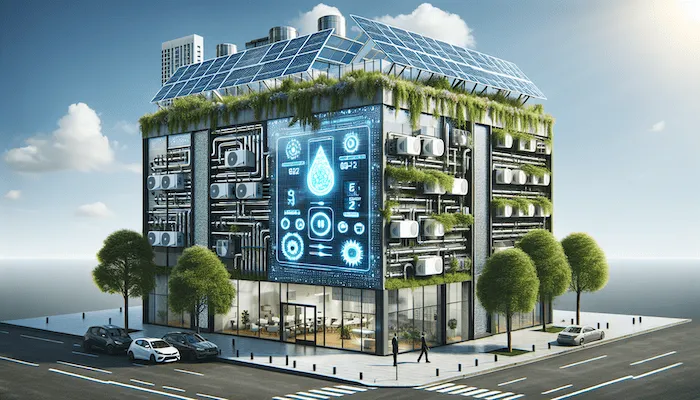Energy Efficiency Strategies for Commercial HVAC Systems

Energy consumption plays a big role in the overhead of businesses. The costs make optimizing Heating, Ventilation, and Air Conditioning (HVAC) systems to effectively manage your air conditioning a priority. Not only is it environmentally-conscious - it's also a smart financial strategy. This can lead to reductions in operational costs and contribute to a smaller carbon footprint.
Understanding the Energy Use of HVAC Systems
In commercial settings, managing energy use poses a substantial challenge, with HVAC systems often being a primary contributor to high energy bills. Beyond the financial implications, the environmental costs of running an inefficient system are profound. Since energy production predominantly relies on burning fossil fuels, a reduction in energy use is vital. By adopting strategies that manage heating and cooling more efficiently, businesses can reduce their environmental impact alongside their energy costs.
One key factor in managing HVAC energy use is understanding the building's specific needs. This involves conducting an energy audit to identify areas of inefficiency and potential improvements. By analyzing factors such as occupancy patterns, temperature preferences, and the age and condition of current equipment, businesses can develop a tailored strategy for optimizing their HVAC systems. This targeted approach ensures that energy-saving measures are effective and appropriate for the unique characteristics of each commercial space.
Advancements in HVAC Technology
Recent technological advancements have made available several upgrades aimed at improving the efficiency of commercial HVAC systems. Smart thermostats and Variable Frequency Drives (VFDs) represent essential upgrades for modern, energy-efficient operations. These thermostats adjust heating and cooling based on actual needs and external conditions, while VFDs modulate the speed of components based on demand, effectively reducing energy use during periods of low demand. These upgrades can significantly reduce energy consumption. They can also prolong the operational life of the system by minimizing wear and tear.
Another technological advancement in HVAC systems is the use of smart sensors. These devices can monitor various parameters such as temperature, humidity, and occupancy in different zones of the building. By providing real-time data, smart sensors enable the HVAC system to make dynamic adjustments based on actual conditions and requirements. This level of precision control helps to cut energy waste by delivering heating or cooling only when and where it is needed. This results in significant energy savings over time.
The Importance of Regular Maintenance
Proactive maintenance is crucial for keeping HVAC systems operating efficiently. Regular checks can prevent minor issues from becoming major repairs, leading to significant savings. Actions as basic as cleaning or replacing air filters can greatly improve a system's efficiency and the quality of indoor air, while professional inspections can identify less obvious problems like duct leaks. Consistent maintenance results in lower utility expenses and reduces the likelihood of system breakdowns.
Efficient HVAC System Design
It's beneficial to consider an energy-efficient design when upgrading or installing a new HVAC system. Innovations like zone control systems allow for heating or cooling of specific areas based on use, thereby avoiding energy waste. Furthermore, Energy Recovery Ventilation (ERV) systems can use the energy from exhaust air to improve incoming air conditions, enhancing both efficiency and comfort. Alternative options, such as solar-powered cooling technologies, also offer the possibility of aligning with sustainable goals while reducing reliance on conventional energy sources.
Financial Incentives for Energy Efficiency
Investing in energy-efficient HVAC upgrades can make businesses eligible for various incentives and rebates. It's a win-win as it can ease the financial burden of such investments. Governments and energy providers often offer these benefits to encourage businesses to reduce their energy use. It helps to support sustainability objectives while also bolstering the bottom line. Taking advantage of these incentive programs can make the decision to invest in HVAC efficiency both economically and environmentally sound.
Enhancing the energy efficiency of commercial HVAC systems involves a blend of smart technology upgrades, regular maintenance, and thoughtful system design. By adopting these strategies, businesses can significantly cut operational costs. Moreover, it can reduce their environmental impact, and create more comfortable indoor environments. Investing in HVAC efficiency is a pragmatic step towards sustainability and business success.
Also read
- Home EV Charging Stations in Ireland: How Much Can You Really Save?
- Automated File Conversion Services: Transform Documents Without Manual Work
- The Rapid Evolution of Direct Current Fast Charging for Electric Vehicle Fleets
- Scaling Data-Driven Campaigns Without Breaking Your Stack
- The 12th World Sustainability Forum (WSF-12)

